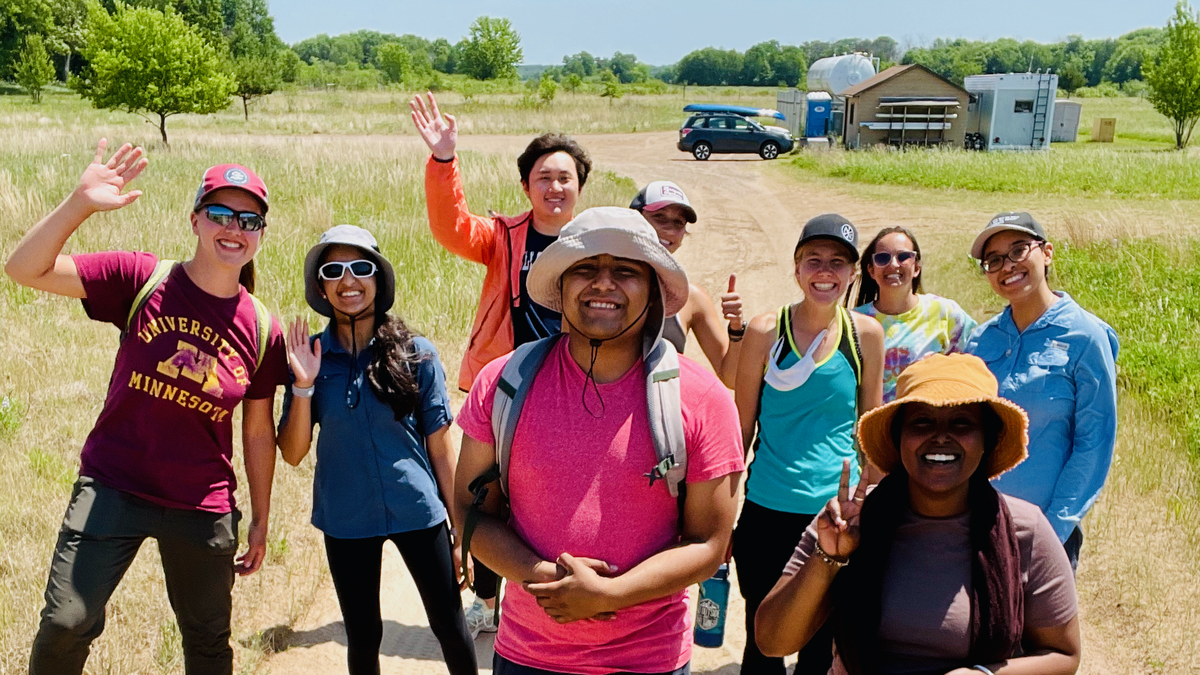General Page Media

All people are welcome in our lab. People who identify with marginalized or underrepresented groups are particularly encouraged to apply.
Direct questions to Forest Isbell: [email protected]
Current openings:
Summer 2024: Field Research Positions in Plant Ecology for Undergraduate Students and Recent Graduates.
Information for:
Information for:
+
Prospective postdocs
- Prospective postdocs with funding and with sufficient overlap in research interests are always welcome to apply. Please also feel free to contact me if you would like to pursue other funding opportunities such as the UMN President's Postdoctoral Fellowship Program (this program seeks to diversify the people and perspectives at UMN), the Institute on the Environment's Postdoctoral Fellowship, NSF's Postdoctoral Research Fellowships in Biology, The Nature Conservancy's NatureNet Science Fellows Program, the Smith Fellows Program, or other similar programs that support postdocs. After reading some of my publications and my expectations below, please email me a brief cover letter describing your research questions or topics of interest, your CV, and 1 or 2 of your publications.
+
Prospective grad students
- Beginning September 2023, I will be on sabbatical for one year and will not be actively recruiting new graduate students.
- Our EEB graduate program guarantees five years of support for all students admitted. Typically, students have a combination of fellowships, research assistantships, and teaching assistantships. Prospective graduate students are encouraged to apply for Fellowships, such as the National Science Foundation's Graduate Research Fellowship Program.
- We have a diverse and inclusive team. We encourage applications from students who identify with marginalized groups and who actively contribute to efforts that promote DEIJ.
- Prospective graduate students with sufficient overlap in research interests are welcome to apply. Prospective graduate students should see the EEB graduate program website here, read some of my publications, and read my expectations below. If after reading this information you feel that we have sufficient overlap in research interests, please email me a brief cover letter describing your research questions or topics of interest and your CV. I am most interested in your passion for science and nature, your growth mindset and distance traveled (i.e., how you have navigated challenges), and your demonstrated commitment to service, including your contributions (either through your identity or your efforts) to promoting diversity, equity, inclusion, and justice. The EEB graduate program does not require GRE scores and waives application fees for SACNAS members.
+
Prospective undergrad students
- Each summer, we hire a team of undergraduate students to work on many of our field research projects at Cedar Creek Ecosystem Science Reserve, which is located about an hour north of the Twin Cities. We advertise these positions in the winter and hire in the spring. The minimum rate of pay is $15 per hour. Paid undergraduate positions in our lab will be posted on GopheResearch.
- We have a diverse and inclusive team. We encourage applications from students who identify with marginalized groups and who actively contribute to efforts that promote DEIJ.
- Prospective undergraduate students from the University of Minnesota, please learn more about undergraduate research opportunities below. Prospective undergraduate students from other institutions, please also feel welcome to apply for paid positions. Each summer, we hire students from many institutions.
- Summary of research opportunities for UMN undergraduate students:
- Paid positions:
- Research grants: Most positions in our lab group are paid and supported by research grants. The minimum rate of pay is $15 per hour. Paid undergraduate positions in our lab will be posted on GopheResearch.
- UROP: This is a university-wide funding opportunity that pays students to conduct research over the course of a semester or over the summer. Students need to identify and work with a faculty mentor to write a short proposal describing their proposed research. Check here for more information and application criteria and here for CBS-specific guidelines.
- Dean’s Research Program (DRP): This paid research position was established by the Dean’s office to ensure all CBS students have the opportunity for a real research experience during their tenure in CBS. Faculty participating in the program submit their information and briefly describe potential research projects. Students can then apply and indicate their preferred research projects. There are requests for DRP applications before both fall and spring semesters and the summer.
- Course credit positions:
- BIOL2996: This one credit course is designed to allow students to learn more about a research labs. Students generally attend lab meetings, read and discuss papers from the lab, and shadow lab members to learn more about the research being conducted. The lab also learns about the student, their reliability, enthusiasm in the research, etc. This can often be a steppingstone into a more comprehensive research experience.
- Directed research: This upper-level course provides an opportunity for students to conduct research for credit. Students will work with a faculty mentor to identify a research question to work on over the course of a semester. The number of credits can vary (One credit ≈ Three hours/week) but generally students take at least three credits/semester. This course can often fulfill one of the advanced lab course requirements.
- As a reminder, students cannot get paid and get credit for the same research as this is a violation of federal law. However, students can get credit for research done in one lab and be paid for work conducted in a different lab.
- Paid positions: